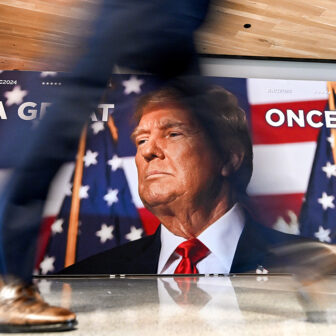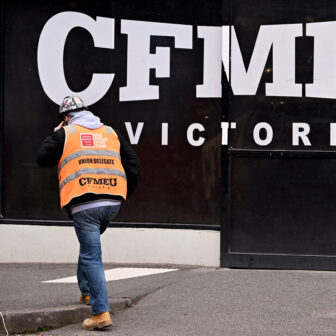The year began with a moment so critical in the contemporary political world that the fallout may take decades to comprehend. Journalists reporting from Capitol Hill on the afternoon of 6 January watched in disbelief as a protest march turned into a violent siege of Congress. Speculation moved into the realms of the unthinkable. Was the fall of the US government happening live on television?
Not yet, as it transpired, and nor was the fall of the Republican Party, which continues to deny its real significance. Coincidentally or not, the fall that didn’t quite happen has been a central theme in several major American television series this year. Following major disruption to production schedules through the pandemic, The Morning Show (Apple Plus), Billions (Showtime) and Succession (HBO) all returned with new seasons about those who surf the high tides of wealth, power and celebrity.
The leading characters may not be likeable but their complex and often perverse personalities have disturbing resonances in the real world. Their fantasies, delusions, moods and impulses are consequential because wealth and celebrity mean power. Not the power of the presidency, though they sometimes come close to it, but power that is wide-ranging and even fundamental.
Billions continued its rollercoaster ride through the theme park of hedge fund capitalism, where the key players, always seemingly headed for a crash, take daredevil loops into the next escapade. This year’s season five eventually saw the departure of Damien Lewis from the lead role of maverick trader Bobby “Axe” Axelrod after a marathon combat with prosecutor Chuck Rhoades (Paul Giametti) and, for a while, it looked like a classic downfall.
Regular viewers, of course, knew better than to expect anything like that. Victories and losses in this arena are never final and, while billions are always at stake, that never seems to matter much. It’s all about the combat, which plays out in round after round of alpha male confrontation that is at times overtly primordial.
Episode one begins literally in the jungle, with Axe and his right-hand guy Mike Wagner (David Costabile) bellowing and beating their chests under the influence of the psychoactive brew ayahuasca. Afterwards they hare off on motorbikes, bearded and leather-clad, to get back to the city and be restyled in time for a contest with new challenger Mike Prince (Corey Stoll): not a shootout, but a photoshoot for GQ, vying for the cover profile.
Meanwhile, over at the headquarters of Axe Capital, the women are proving that they too can play hard. Performance coach Wendy Rhoades (Maggie Siff) has arranged a stunt with a friend who poses as a feral intruder looking for trouble. They throw each other across tables, do a few spins and backflips then embrace to the applause of the assembled company. “Now are we ready to do the fucking job for each other?” yells Wendy.
That’s Billions, subtle as a shower of brickbats. Purporting to offer an updated interpretation of game theory, a view of human nature developed by the Rand Corporation in the 1950s, the dramaturgy always revolves around competitive individualism, where collaboration is only another means of serving one’s own ends.
Axe’s departure, with its soundtrack of Bob Dylan’s “Like a Rolling Stone,” may signal the emergence of an instinct to escape the psychological straitjacket, but maybe not. “Why can’t we make our own?” was his response to Chuck’s challenge about the need to recognise wider laws in the universe. Prince arrives to take over Axe’s company, quoting Emerson and apparently offering a more expansive philosophy, until his concluding pronouncement: “What this is, is mine.” Ultimately, this gives us an Ayn Rand world — endlessly profitable but weary, stale and flat.
In its first season, The Morning Show offered a welcome antidote, working a blend of farce and pathos in its portrayal of a major television network descending into mayhem when leading anchor Mitch Kessler (Steve Carell) is forced to leave following allegations of abuse. There was genuine sparkle in the performances of Jennifer Aniston and Reese Witherspoon as Alex Levy and Bradley Jackson, the presenters left with the challenge of holding the audience and restoring confidence.
Integrity, of the news and those communicating it, remains a central theme in season two, but the business of distinguishing between genuine integrity and its public enactment becomes increasingly tortuous. Kessler’s fall is terminal, but with other key personnel implicated in the scandal, the fall of the network is what counts; and there, the public face is all that matters.
The longer story arcs of The Morning Show follow each of the central characters as they confront the question of what it means to be a good or worthwhile person. Their explorations take them on divergent paths, which means the new season has been criticised for lack of dramatic cohesion. Aniston and Witherspoon don’t have enough good material to work with and risk settling into prototypes: Alex as the melancholic narcissist, unable to escape her own mannered persona, and Bradley as the queen of charm whose zipped-on smile vanishes as instantly as it appears.
But showrunners Jay Carson and Kerry Ehrin should be credited with some serious thematic commitment. With his capacity to escape every impasse by stretching the parameters of the situation, chief executive Cory Ellison (Billy Crudup) emerges as the most dynamic figure, becoming a focus for larger questions about the corporate ethos he represents.
Stood down in the first phase of the crisis, he makes a defiant return as head of the news division and fronts the board with debonair contempt. Holland Taylor gives a crisp vignette performance as the board’s chair, Cybil Richards, getting nowhere in her attempts to exert authority over someone whose response to her demands is, “You really think that’s what this is all about, your little television network? This is a battle for the soul of the universe.”
Crudup portrays him as a lightning-witted improviser, always fully present in the moment, “exploiting the landscape of chaos.” Perceptive in interviews, Crudup speculates that if wealth and celebrity are the foundations of our value system, the implicit assumption is that individuals who personify those things must somehow be good.
The invitation to perform honesty, warmth and courage is always there, and some have the talent to do it with aplomb, but when the quest for goodness becomes introspective, as it does for each of the leading characters, and eventually for Cory himself, the corporate vehicle they are piloting may indeed go off the rails.
Succession has been compared to classical dramas of dynastic power and family conflict. Scripted with brutal wit and terse intelligence, and featuring a superb ensemble cast, it is widely acknowledged to be in a class of its own. Nevertheless, I have friends who won’t watch it, saying that the personalities it portrays are too toxic. And so they are, but the history of drama is filled with toxic characters. In ancient Greek tragedy, five generations of the house of Atreus engage in an unrelenting exchange of atrocities. Shakespeare gives us the murderous family pathologies of Hamlet and King Lear.
In these canonical models, the dramatic arc moves towards redemption through the downfall of the villains, and the termination of the regimes over which they have presided. But the rollout of the multi-season television drama allows the dramatic fall to be protracted, and perhaps ultimately averted, and therein lies the most troubling aspect of the contemporary picture.
The central strand of tension in Succession lies in an unresolved question: are we in a world that can no longer bring down a ruthless potentate and the twisted system of values over which s/he presides? Ageing media magnate Logan Roy (Brian Cox) is no mafia figure. He doesn’t dispatch people with physical violence; he destroys them by capsizing their economies and, if they are part of his inner circle, through humiliation and personal abuse. His four adult children are treated to the psychological equivalent of flaying.
This shouldn’t be fun to watch, but sadism in the realms of psychology has always been the stuff of comedy, where unfailing resilience is a source of entertainment. Connor (Alan Ruck), Roy’s eldest son, has an obtuseness that forms a natural defence: when he’s being got at, he usually just doesn’t get it. Roman (Kieran Culkin) and his sister Shiv (Sarah Snook), children of a second marriage, sharpen their wits on each other through pseudo-incestuous sparring that is exuberant and vicious by turns.
Some farcical secondary fallout comes from Shiv’s earnest spouse Tom (Matthew Macfadyen) who rolls with punches then takes it out through mock-bullying sessions with cousin Greg (Nicholas Braun). Only Kendall (Jeremy Strong) seems to have enough human sensitivity to be really vulnerable to the abuse, which, of course, makes him Logan’s prime target.
Spoiled, arrogant and petty, they are all ruined personalities, playing the game of corporate succession because it’s all they know how to do, though much of the comedy arises from their conviction that they can do pretty much anything. Shiv thinks she can dance, Kendall thinks he can sing, Roman fancies himself as a slick negotiator and Connor thinks he can be president.
How it will all turn out is unclear, and with a fourth season announced recently it is likely to remain so for some time, but don’t expect any catharsis. Chaos will always come again, and we live in an era when those who thrive in its landscapes are almost impossible to bring down. •




